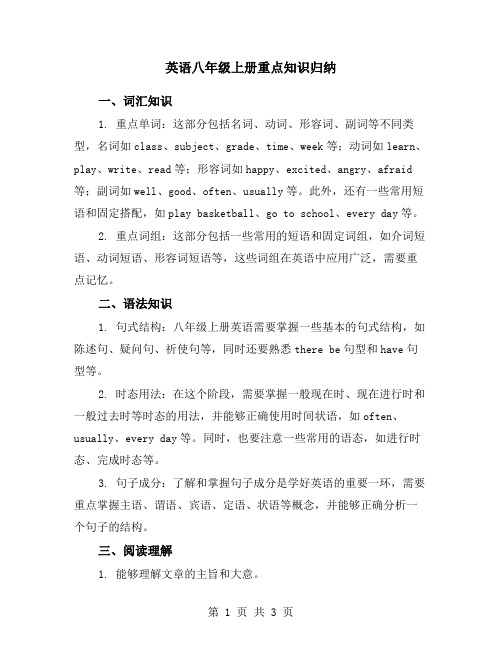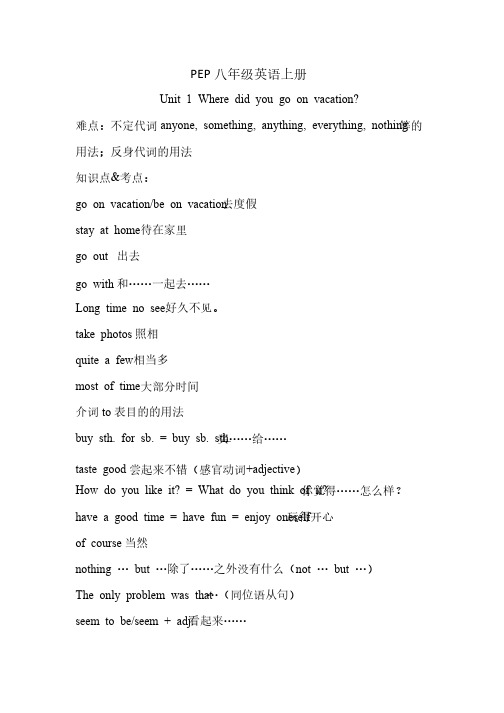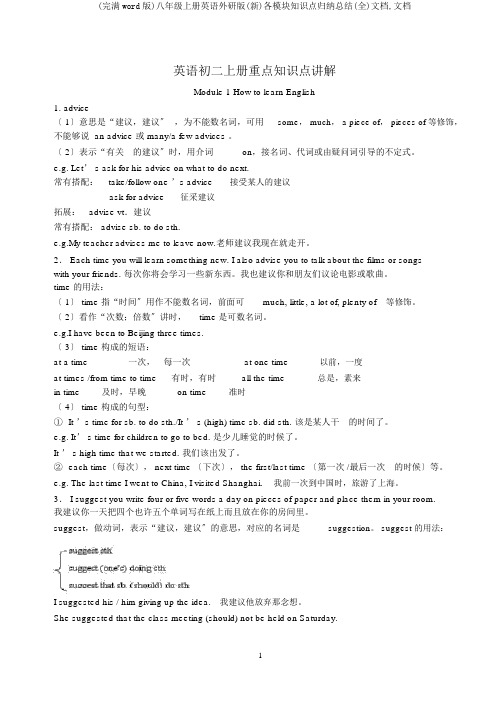初二英语上册的知识点大全:重难点汇总
英语八年级上册重点知识归纳

英语八年级上册重点知识归纳一、词汇知识1. 重点单词:这部分包括名词、动词、形容词、副词等不同类型,名词如class、subject、grade、time、week等;动词如learn、play、write、read等;形容词如happy、excited、angry、afraid 等;副词如well、good、often、usually等。
此外,还有一些常用短语和固定搭配,如play basketball、go to school、every day等。
2. 重点词组:这部分包括一些常用的短语和固定词组,如介词短语、动词短语、形容词短语等,这些词组在英语中应用广泛,需要重点记忆。
二、语法知识1. 句式结构:八年级上册英语需要掌握一些基本的句式结构,如陈述句、疑问句、祈使句等,同时还要熟悉there be句型和have句型等。
2. 时态用法:在这个阶段,需要掌握一般现在时、现在进行时和一般过去时等时态的用法,并能够正确使用时间状语,如often、usually、every day等。
同时,也要注意一些常用的语态,如进行时态、完成时态等。
3. 句子成分:了解和掌握句子成分是学好英语的重要一环,需要重点掌握主语、谓语、宾语、定语、状语等概念,并能够正确分析一个句子的结构。
三、阅读理解1. 能够理解文章的主旨和大意。
2. 能够理解文章的细节和事实。
3. 能够根据上下文猜测生词的意思。
4. 能够理解作者的观点和态度。
5. 不断提高阅读速度和理解能力。
四、写作知识1. 写作技巧:掌握一些基本的写作技巧,如正确的语法、拼写和标点符号,以及正确的文章结构等。
2. 写作实践:通过不断的写作练习,提高自己的写作能力。
除此之外,八年级上册英语还需要注意以下几个方面:1. 听力训练:每天坚持进行听力训练,提高听力理解能力。
2. 口语表达:鼓励学生多进行口语练习,提高口语表达能力。
在口语表达中要注意语音、语调和语速等方面的问题,同时也要注意表达的准确性和得体性。
人教新目标八年级英语上册重难点知识点归纳

PEP八年级英语上册八年级英语上册Unit 1 Where did you go on vacation? 难点:不定代词anyone, something, anything, everything, nothing等的用法;反身代词的用法用法;反身代词的用法知识点&考点:考点:go on vacation/be on vacation 去度假去度假stay at home 待在家里待在家里待在家里go out 出去出去go with 和……一起去……和……一起去……Long time no see. 好久不见。
好久不见。
take photos 照相照相quite a few 相当多相当多相当多most of time 大部分时间大部分时间大部分时间表目的的用法介词to表目的的用法buy sth. for sb. = buy sb. sth. 买……给……买……给……taste good 尝起来不错(感官动词+adjective)How do you like it? = What do you think of it? 你觉得……怎么样?你觉得……怎么样?have a good time = have fun = enjoy oneself玩得开心玩得开心of course 当然当然nothing …but …除了……之外没有什么(not …but …)…)The only problem was that …(同位语从句)…(同位语从句)seem to be/seem + adj. 看起来……看起来……keep a diary 记日记记日记记日记 + at + 小地点小地点小地点arrive + in + 大地点大地点大地点 decide to do 决定做某事决定做某事决定做某事 try doing sth. 尝试做某事尝试做某事尝试做某事 try to do sth. 尽力做某事尽力做某事feel like 感觉到感觉到 feel like + n./ v-ing 想要……想要……ride … to …骑……到………骑……到……许多的:a lot of + 可数名词可数名词 lots of + 可数可数or 不可数名词不可数名词 I wonder that …我想知道………我想知道………我想知道…… in the past 在过去在过去在过去 enjoy doing sth. 享受做某事享受做某事享受做某事 walk around 到处逛逛到处逛逛感叹句:What + 冠词冠词 + adj. + n. + (it is) = How + adj. + 冠词冠词 + n. + (it is) start start doing doing doing sth. sth. 开始做某事开始做某事 stop stop doing doing doing sth. sth. 停止做某事停止做某事 finish finish doing doing sth. 结束做某事结束做某事because & so (不可同用)(不可同用)(不可同用) wait for …等待………等待……because of + n. a little/ a few 一些(两者的区别,以及与little/few 的区别)的区别) enough + n. / adj. + enough as + adj./adv. + as 和……一样……和……一样……one bowl of …一碗………一碗……along the way 沿着这条路沿着这条路沿着这条路 时间段+ later = after + 时间段……之后时间段……之后other, others, the other, the others, another on trip 在旅途中在旅途中find out 找到,找出找到,找出 / find 寻找寻找 / look for 寻找寻找寻找 so + adj. + that + 从句如此……以致……从句如此……以致……tell sb. (not) to do sth. 告诉某人(不要)做某事告诉某人(不要)做某事keep doing sth. / go on doing sth. 继续做某事继续做某事keep sth. + adj. 使……保持……状态使……保持……状态up and down (人)来来往往;(人)来来往往;(物)上上下下(物)上上下下in excitement = excitedly 兴奋地兴奋地come up / come out / come on / come in forget to do sth. 忘记做某事忘记做某事 forget doing sth. 忘记做过某事忘记做过某事忘记做过某事 like / dislike + n. / v-ing 喜欢/不喜欢某物/做某事做某事something + adj. ……的事情……的事情……的事情 Why not + v. = Why don ’t you + v. 为什么不……呢?为什么不……呢?Unit 2 How often do you exercise? 重点:1. How often 句型的运用;2. 2. 六个频度副词六个频度副词never, hardly ever, sometimes, sometimes, often, often, often, usually, usually, usually, always always 的差异、理解及使用;3. 频率数词once, twice 等的认识和运用;4. 一般现在时不同人称谓语形式的变化及一般疑问句的问答。
8年级上册英语全部知识点

8年级上册英语全部知识点一、Unit 1 Where did you go on vacation?1. 重点单词。
- anyone pron. 任何人,常用于否定句和疑问句中。
例如:Did you meet anyone interesting?- anywhere adv. 在任何地方,用于否定句和疑问句。
如:I can't find my pen anywhere.- wonderful adj. 精彩的;绝妙的。
可以用来形容经历、事物等,例如:We had a wonderful time on the beach.- few adj. & pron. 不多;很少,修饰可数名词复数,表示否定意义。
例如:Few students like this difficult subject.- quite a few相当多;不少,后接可数名词复数。
例如:There are quite a few books on the shelf.- most adj., adv. & pron. 最多;大多数。
例如:Most students in our class like English.- something pron. 某事;某物,常用于肯定句中。
例如:I have something important to tell you.- nothing pron. 没有什么;没有一件东西,例如:There is nothing in the box.- everyone pron. 每人;人人;所有人,例如:Everyone should follow the rules.- myself pron. 我自己;我本人,是反身代词。
例如:I can look after myself.- yourself pron. 你自己;您自己,例如:You should believe in yourself.2. 重点短语。
初二上册英语重难点

初二上册英语重难点初二上册英语重难点初二上册英语是初中阶段的第二年,是学习英语的关键时期。
本篇文章将从词汇、语法和阅读理解三个方面来总结初二上册英语的重难点。
一、词汇1. 动词时态初二上册英语中,动词时态的使用比较广泛。
主要包括一般现在时、一般过去时和一般将来时。
学生们要掌握这些时态的构成和用法,能够正确运用于日常对话和写作中。
2. 名词的单复数名词的单复数是初中学习英语的基础知识点。
在初二上册英语中,名词的单复数的转换也是比较频繁的,在阅读和写作中经常会用到。
学生们要熟练掌握名词的单复数形式。
3. 介词的用法介词是一个较为抽象和难以理解的语法点。
初二上册英语中,介词的用法比较多样化,不同的介词可以表示不同的意义。
学生们要通过大量的阅读和写作来提高对介词的使用能力。
二、语法1. 时态和语态初二上册英语中,时态和语态的使用是一个重要的语法点。
时态可以表达动作的时间关系,语态可以表达主语和谓语之间的关系。
学生们要能够根据句子的语境和意义来正确选择时态和语态。
2. 基本句型和从句初二上册英语中,基本句型的使用也是一个重要的语法点。
学生们要掌握基本的主谓宾句型和主谓宾补句型的使用,并能够正确地使用宾语从句和状语从句。
3. 特殊疑问句和陈述句的转换在初二上册英语中,特殊疑问句和陈述句的转换是一个常见的语法点。
学生们要掌握特殊疑问词的用法和特殊疑问句的构成,能够运用于日常对话和书面表达中。
三、阅读理解1. 信息获取和推理初二上册英语中,阅读理解的难点主要在于信息获取和推理。
学生们要通过阅读材料,快速准确地找到关键信息,并能够根据信息进行推理。
2. 文章结构和文章意义初二上册英语中,阅读理解也涉及到对文章结构和文章意义的理解。
学生们要能够分析文章的结构和文字的逻辑关系,理解作者想要表达的意思。
3. 阅读策略和技巧阅读理解也需要学生们掌握一定的阅读策略和技巧,如预测、回答问题和总结等。
学生们要通过实践,不断提高自己的阅读能力和理解能力。
八年级英语上册全部语法难点汇总

八年级英语上册全部语法难点汇总1. 形容词/副词的比较级和最高级的构成规则(1)单音节词和少数以-er,-ow结尾的双音节单词,比较级在后面加-er,最高级在后面加-est。
① 单音节单词small→smaller→smallest short→shorter→shortesttall→taller→tallest great→greater→greatest②少数以-er,-ow结尾的双音节单词clever→cleverer→cleverest narrow→narrower→narrowest(2)以不发音e结尾的单音节单词,比较级在原形后加-r,最高级在原级后加-st。
large→larger→largest nice→nicer→nicest able→abler→ablest(3)以一个辅音字母结尾的闭音节(即:辅音+元音+辅音)单词中,先双写末尾的辅音字母,比较级加-er,最高级加-est。
big→bigger→biggest hot→hotter→hottest fat→fatter→fattest(4)以“辅音字母+y”结尾的双音节词,把y改为i,比较级加-er,最高级加-est。
easy→easier→easiest heavy→heavier→heaviestbusy→busier→busiest happy→happier→happiest(5)其他双音节词和多音节词,比较级在前面加more,最高级在前面加most。
beautiful→more beautiful→most beautifuldifferent→more different→most differenteasily→more easily→most easily(6)有少数形容词、副词的比较级和最高级是不规则的,必须熟记。
good→better→best well→better→bestbad→worse→worst ill→worse→worstold→older/elder→oldest/eldestmany/much→more→most little→less→leastfar →further/farther→ furth est/farthest2. 形容词和副词比较级的用法(1)“甲+be+(倍数)+形容词比较级+than+乙”表示“甲比乙…”或“甲比乙…几倍”。
(完整word版)八年级上册英语外研版(新)各模块知识点归纳总结(全)文档,文档

英语初二上册重点知识点讲解Module 1 How to learn English1. advice〔 1〕意思是“建议,建议〞,为不能数名词,可用some, much, a piece of, pieces of 等修饰,不能够说 an advice 或 many/a few advices 。
〔 2〕表示“有关的建议〞时,用介词on,接名词、代词或由疑问词引导的不定式。
e.g. Let’ s ask for his advice on what to do next.常有搭配:take/follow one ’s advice接受某人的建议ask for advice征采建议拓展:advise vt.建议常有搭配: advise sb. to do sth.e.g.My teacher advises me to leave now.老师建议我现在就走开。
2. Each time you will learn something new. I also advise you to talk about the films or songswith your friends. 每次你将会学习一些新东西。
我也建议你和朋友们议论电影或歌曲。
time 的用法:〔 1〕 time 指“时间〞用作不能数名词,前面可much, little, a lot of, plenty of等修饰。
〔 2〕看作“次数;倍数〞讲时,time 是可数名词。
e.g.I have been to Beijing three times.〔 3〕 time 构成的短语:at a time一次,每一次at one time以前,一度at times /from time to time有时,有时all the time总是,素来in time及时,早晚on time准时〔 4〕 time 构成的句型:①It ’s time for sb. to do sth./It ’ s (high) time sb. did sth. 该是某人干的时间了。
初二英语上下册重点知识点归纳

英语八年级上册知识要点Unit 1 How often do you exercise?重点语法:频率副词询问别人做某事的频繁程度提问用How often 引导特殊疑问句回答用always, sometimes, twice a day 等频率副词。
例句:A: How often do you watch TV?(你多长时间看一次电视?)B: I watch TV every day.(我每天都看电视。
)A: What's your favorite program?(你最喜欢的节目是什么?)B: It's Animal World.(是《动物世界》。
)A: How often do you watch it?(你多长时间看一次这个节目?)主要频率副词的等级排序:always(总是) > usually (通常) > often(经常) > sometimes(有时) > hardly ever(很少) > never(从不)隔一段时间做某事数次用数词+ 时间间隔的结构构成。
如:once a week 一周一次(“一次”用特殊词once)twice a day 一天两次(“两次”用特殊词twice)three times a month 一个月三次(三次或三次以上用基数词+ times 的结构构成)four times a year 一年四次重点短语:how often 多久一次as for 至于;关于how many 多少(针对可数名词)how much 多少(针对不可数名词)of course = sure 当然;确信look after = take care of = care for 照顾;照看a lot of = lots of = plenty of 许多;大量every day 每一天every night 每晚hardly ever 几乎不be good for 对……有益be good for one's health 有益健康try to do sth. 尝试做某事get good grades 取得好成绩help sb. [to] do sth. 帮助某人做某事kind of 有点want [sb.] to do sth. 想要(某人)做某事keep in good health 保持健康No two men think alike. 人心各异。
八年级上册英语重点知识点

八年级上册英语重点知识点英语重点学问点一、重点短语1. on time2. best wishes3. give a talk4. for example5. short for6. a waste of time7. go on a field trip8. go fishing9. I agree10. next week11. the day after tomorrow12. have a picnic13. have some problems doing sth.14. go the wrong way15. hurry up16. get together17. in the open air18. on Mid-Autumn Day19. come over20. have to21. get home22. agree with23. in the country24. in town25. all the same26. in front of27. on the left/right side28. next to29. up and down30. keep healthy31. grow up32. at the same time33. the day before yesterday35. last Saturday36. half an hour ago37. a moment ago38. just now39. by the way40. all the time41. at first二. 重要句型1. have fun doing sth.2. Why dont you?3. Were going to do sth.4. start with sth.5. Why not?6. Are you going to?7. be friendly to sb.8. Youd better do sth.9. ask sb. for sth.10. say goodbye to sb.11. Good luck(with sb)!三. 交际用语1.Welcome backto school!2.Excuse me. Im sorry Im late, because the traffic is bad.3.It doesnt matter.4.Happy Teachers Day !5.Thats a good idea.6.What are you going to do?7.Where are we going ?8.What are we going to do ?9.Im good at10.Its not far from11. Are you free tomorrow evening?12.Would you and Lily like to come over to my home for Mid-Autumn Festival?13.Im glad you can come.14.Thanks for asking us.15.How about another one?16.May I have a taste?17.Let me walk with you.18.What do you have to do?19.Do you live on a farm?20.Which do you like better, the city or the country?21.Which do you like best, dogs, cats or chickens?22.Shall we go at ten? Good idea!23.---Lets make it half past one. ---OK.24.---Why not come a little earlier? ---All right.25.Excuse me. Wheres the nearest post office, please?26.Its over there on the right.27.Im sorry I dont know.28.Youd better29.Thank you all the same.30.Which bus do I take?31.Go along this road.32.What day was it yesterday?33.Im sorry to hear that.34.I hope youre better now.35.Why did you call me?36.I called to tell四. 重要语法1.be going to的用法;2.形容词的比拟级、最高级;3.形容词和副词的比拟4.一般过去时五.重要学问点讲解1. on the street / in the street表示在街上时,on the street 和in the street 都可以,在美国多用on the street, 在英国多用in the street. 例如:We have a house in the street. 我们在街上有座房子。
- 1、下载文档前请自行甄别文档内容的完整性,平台不提供额外的编辑、内容补充、找答案等附加服务。
- 2、"仅部分预览"的文档,不可在线预览部分如存在完整性等问题,可反馈申请退款(可完整预览的文档不适用该条件!)。
- 3、如文档侵犯您的权益,请联系客服反馈,我们会尽快为您处理(人工客服工作时间:9:00-18:30)。
初二英语上册的知识点大全:重难点汇总1. Why don’t you do ... ?提建 2. Why not do ... ? Thanks!议的3. You should (shouldn’t) do ... . 回答 Good!表达4. It’s a good idea to do ... . Excellent!方式 5. Try (not) to do ... .6. How about/ What about doing ... ?1. You should speak English in class.2. You should write down your mistakes in your notebooks.3. Why don’t you write down the correct spelling and grammar next to the mistakes?4. How about listening to the radio or reading a newspaper in English?5. Try not to translate every word.6. Everyone should have a pen friend and write email messages to each other.7. It’s a good idea to check your vocabulary notebook every day.现在完成时:1. 过去发生或完成的动作对现在造成了一定的影响和后果;2. 结构:由助动词have/has +动词的过去分词构成;肯定句现在完成时的肯定句式是“have(has)+过去分词”。
注意:该句式中的have或has是助动词,has用于第三人称单数,其它人称一律用have。
疑问句现在完成时的一般疑问句式是把助动词have或has提到主语之前。
回答:Yes, … have(has).No, … haven’t(hasn’t).否定句:现在完成时的否定句式是“haven't(hasn't)+过去分词”。
3. 现在完成时的时间状语:already, just, yet, since, ever, never;4. 与一般过去时的区别:一般过去时是强调动作在过去发生,而现在完成时是强调过去发生的动作对现在造成了影响和后果。
5.一般过去时的时间状语:yesterday, just now, …ago, last week, 2 years ago,in 1980等。
例:We planted (plant) some flowers in the garden last week.I have sent (send) the letter.He has come (come ) back home, he is watching (watch) TV now.David finished (finish) his homework just now.The monkeys are full, because we have fed (feed) them.A: I have lost (lose) my purse!B. Bad luck! When did you lose (lose) it?A: I lost (lose) it last night.与现在完成时连用的几个副词:already, just, ever, yet, never肯定句: already, just疑问句和否定句: ever, yet, neveryet 常置于句末already, never, ever just一般置于助动词have/has之后,过去分词之前.例:用 already, just或never, yet完成句子1) I have been to many big cities, but I havenever been to Shanghai.2) Most of us have already finished our compositions.3) Have they taken down the old pictures yet ? No, not yet .4) He has already visited Beijing twice.5) I have just heard the news. I know it.7. 现在完成时中的for和since(1)for + 一段时间(用How long提问)We have known each other for ten years. 我们相识10年了。
(2)since + 句子/具体时间since 引导的短语或从句用How long提问①since+过去一个时间点(具体的年、月、日、钟点等)。
Tom has eaten nothing since yesterday.②since +一段时间+agoWe have been friends since five months ago. 从5个月前起,我们就成了朋友。
③since+从句,表示“自过去某个时间、某件事情以来”,从句时态:一般过去时。
I have lived here since I left Shanghai.④It is+一段时间+since从句,表示“自从某件事发生已有一段时间了”。
It is two years since I left school.8. 在含for或since引导的时间状语的现在完成时中,谓语动词只能用延续性动词。
非延续性动词不能直接和for或since 连用。
leave --- be away die --- be deadbegin/start --- be onfinish --- be overcome here --- be here go there --- be therecome back --- be back fall asleep --- be asleepget to/ arrive/reach --- be (in)leave --- be away fromgo (get) out --- be outopen sth --- keep sth openjoin --- be in+组织机构/be a member of+组织机构fall ill --- be illget up --- be upcatch a cold --- have a coldborrow --- keepbuy --- have get to know --- knowput on---wear例:1. The old man died 4 years ago.The old man has been dead for 4 years.2. It is 4 years since the old man died.Four years has passed since the old man died.3. He joined the Party 2 years ago.He has been in the Party for 2 years.4. I bought the book 5 days ago.I have had the book for 5 days.Module 5反意疑问句:用于对某一事物或观点没有确切的把握,或者用于加强自己的观点。
陈述句+简短的一般疑问句 [助动词/be动词/情态动词+代词]肯定或否定与陈述句的主语一致肯定否定否定肯定注意:1. 反问部分的be动词,助动词或情态动词要与陈述句部分一致。
2.陈述句与反问句在时态和人称上要一致。
3.陈述句部分如果为否定句或含有否定意义的词(如:nothing,never, little, few等),反问句要用肯定式;陈述句部分如果式肯定句,反问部分要用否定式。
例:He was not at home at that time, was he?May listens to pops everyday, doesn’t she?We know nothing about him, do we?You haven’t he ard of him, have you?4. 当句子为祈使句时,反问句一般用will you,表示请求或建议对方作某事,询问对方是否愿意。
注:当祈使句为“Let’s ...”结构时,用shall we 反问。
Drive more slowly, will you?Let’s walk out of the library quietly, shall we?5. 回答:看陈述句的肯定部分,当事实为肯定时,用Yes;事实为否定时,用No。
当陈述句为否定句时,把否定部分忽略,只看肯定部分的意思。
过去进行时1.基本概念表示在过去某一具体时间内的某一持续性行为,即过去某一时刻或某一段时间内正在进行的动作。
常和表示过去时间的词组或从句连用。
2.基本结构:be动词的过去式was/were+现在分词即:was/were+doingwas用于第一人称及第三人称单数,were用于第二人称及复数。
3.基本句型肯定式:was/were + doingI/She/He was working on the farm from 2 o’clock to 4 o’clock.2点到4点我/她/他一直都在农场里干活。
否定式:was/were + not+ doingI/She/He wasn’t working on the farm from 2 o’clock to 4 o’clock.2点到4点我/她/他并不在农场里干活。
疑问式:把was/were放于句首。
—Were you/they working on the farm from 2 o’clock to 4 o’clock?2点到4点你/你们/他们一直都在农场里干活吗?—Yes, I was./Yes, we/they were.是的,我/我们/他们在干活。
—No, I wasn’t./No, we/they weren’t.不是,我/我们/他们并没有在干活。
时间状语:at this time yesterday, at that time或以when引导的谓语动词是一般过去时的时间状语等。
4.基本用法(1)表示过去某时间正在进行的动作或持续的行为,常和表过去的时间状语连用。
I was doing my homework at this time yesterday.昨天的这个时候我正在做作业。
